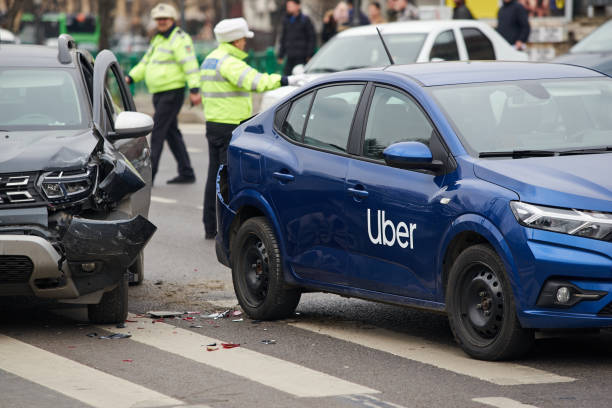Granby Rideshare Accident Lawyer
Do you need a Granby rideshare accident lawyer? If you or a loved one has been involved in an accident with an Uber, Lyft, or rideshare driver—whether as a passenger, another driver, or even a pedestrian—you have rights. Understanding these rights and navigating the complexities of rideshare accident claims requires the help of an experienced attorney. At Etemi Law, we are dedicated to helping victims of rideshare accidents receive the compensation they deserve.
Call us today at (203) 409-8424 for a


The Reality of Rideshare Accidents
Uber and Lyft have revolutionized transportation, providing millions of rides daily across the U.S. However, with the rise of these services, the number of rideshare-related accidents has also increased. Research from Rice University and the University of Chicago suggests that ridesharing services have contributed to a 2-3% increase in U.S. traffic fatalities since 2011, leading to up to 1,100 deaths annually.
Common Causes of Rideshare Accidents
Uber and Lyft drivers often operate under challenging conditions, increasing their risk of accidents. Some of the most common causes include:
- Distracted Driving – Relying on GPS, accepting ride requests, and managing passengers can divert a driver’s attention.
- Driver Fatigue – Many rideshare drivers work long hours or multiple jobs, leading to drowsy driving.
- Unfamiliar Routes – Navigating new areas can cause sudden stops or erratic driving behavior.
- Poor Vehicle Maintenance – Rideshare drivers are responsible for keeping their vehicles in good working condition, but lapses can lead to preventable accidents.
Connecticut Rideshare Laws and Regulations
Connecticut has strict laws governing rideshare companies and their drivers. These include:
- Mandatory Background Checks – Uber and Lyft must conduct background checks on all drivers, including a criminal record and driving history review.
- Vehicle Safety Requirements – Vehicles must pass inspections and meet specific safety criteria.
- Insurance Coverage – Rideshare companies must provide at least $1 million in liability coverage when drivers are transporting passengers.
- Driver Hour Limits – Uber and Lyft drivers can work a maximum of 14 consecutive hours and 16 hours in a 24-hour period to prevent fatigue-related accidents.
Who is Liable in a Rideshare Accident?
Determining liability in an Uber or Lyft accident can be complex, as multiple insurance policies may be involved. Our legal team at Etemi Law will investigate your case to establish liability and maximize your compensation.
If Another Driver is At Fault
- The at-fault driver’s insurance is the first line of compensation.
- If the at-fault driver is uninsured or underinsured, Uber/Lyft’s uninsured motorist coverage may apply.
If the Rideshare Driver is At Fault
- If the driver was logged into the app and waiting for a ride request, Uber/Lyft provides $50,000 per person/$100,000 per accident in bodily injury coverage.
- If the driver was transporting a passenger, Uber/Lyft provides $1 million in liability coverage.
- If the driver was off duty, their personal auto insurance applies.
Why You Need a Granby Uber and Lyft Accident Lawyer
Rideshare accident cases involve multiple insurance companies and complicated liability issues. Insurance companies often try to minimize payouts, but with an experienced attorney from Etemi Law, you can fight for the full compensation you deserve.
Our legal team will: ✅ Investigate the accident thoroughly ✅ Obtain key evidence, including rideshare records and driver logs ✅ Negotiate aggressively with insurance companies ✅ Take your case to court if necessary
Contact Etemi Law Today
If you or a loved one has been injured in an Uber or Lyft accident, don’t wait. Protect your rights and get the compensation you deserve. Contact Etemi Law today for a free consultation.
📞 Call us at (203) 409-8424 💻 Visit us online to schedule your case review
Granby’s winter is a study in slipperiness: black ice forms overnight on Route 20 and the winding stretches of Route 189, turning routine rideshare pickups into high-risk merges and sudden slides. Drivers and passengers who call or accept rides through the town center often face unfamiliar sheet ice where culverts and shaded oaks keep pavement slick well past sunrise. Those conditions change how crews approach scene access and patient stabilization.
When a rideshare trip goes wrong on iced roads, common injuries range from whiplash and concussion to fractured hips in older passengers — injuries that demand time-sensitive assessment. Granby’s local responders stabilize at small EDs then arrange interfacility transfers to higher-level trauma centers such as Baystate Medical Center when imaging or surgical care is needed. Winter weather routinely lengthens transport times and complicates ambulance routing, affecting transfer windows and follow-up planning.
Weekend school events, after-school rides near Granby Memorial High School, and trail access for hikers leaving the McLean Game Refuge all boost rideshare volume during icy stretches, concentrating risk at drop-off points and trailhead lots. That pattern creates predictable injury clusters—sprains from slips, head injuries after falls—followed by phased rehabilitation that often begins with local outpatient therapy before patients travel to larger clinics in Springfield or Hartford for advanced rehab once roads improve.
I’ve watched winters in Granby turn small fender-benders into prolonged medical journeys: delayed ambulance response, weather-hampered transfers, and staggered rehab appointments. Keep clear records of pick-up times, photos of road conditions and communications with rideshare drivers and providers to help reconstruct events for clinicians and insurers. If a transfer to a distant trauma center becomes necessary, expect staged care—stabilize locally, then move when weather and resources allow.
